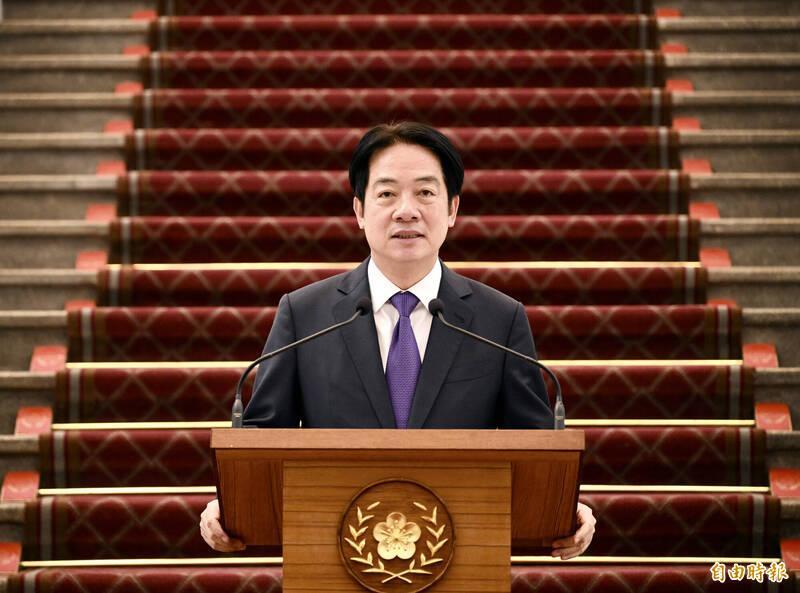President William Lai (賴清德) said that recent rapid appreciation of the New Taiwan dollar against the US dollar was primarily caused by market speculation in conjunction with Taiwan-US talks on tariffs, but his administration would safeguard national interests in negotiations.
In a recorded speech, Lai yesterday said that he regrets that market rumors have prompted the public to dump US dollars, rapidly pushing up the NT dollar on Friday and yesterday, with the local currency soaring 6.21 percent against the greenback in just two trading sessions.

Photo: Lo Pei-de, Taipei Times
Local news media cited analysts as saying that expected pressure from the US to strengthen the NT dollar largely dominated the market, as many Asian countries — including Taiwan — aim to reduce their large trade surpluses with Washington ahead of upcoming talks with the US.
Lai refuted the market rumor, saying that the latest round of bilateral trade talks did not involve currency issues.
In a statement issued yesterday, the Executive Yuan's Office of Trade Negotiation also said that the trade talks concluded on Thursday last week in Washington, the first in-person meeting on tariffs between both sides, did not include currency issues.
Taiwan's strong economic performance and healthy forecast were why the forex market expected stronger NT dollar, Lai said, citing the latest GDP data, which showed growth of 5.37 percent in the first quarter of this year, following a 4.59 percent increase last year.
The IMF even raised its forecast for Taiwan's GDP growth from 2.7 percent to 2.9 percent for this year, while downgrading its forecasts for neighboring economies such as Hong Kong, South Korea and Singapore, he said.
Lai urged Taiwanese to remain confident in the local economy, even though the impact of a stronger NT dollar might vary across industries.
Meanwhile, Lai said the large trade surplus Taiwan enjoys with the US is not related to currency, as it broadly reflects strong demand from US buyers for Taiwan-made high-tech gadgets such as semiconductors, artificial intelligence applications, and information and communications devices.
Taiwan is at a critical moment in terms of tariff talks with the US, Lai said, adding that when the government's negotiating team faces its US counterpart, Taiwanese negotiators are determined to safeguard the national interest, protect industrial development and not sacrifice any industry.
Although Taiwan was unable to isolate itself from the turbulence on global financial markets after US President Donald Trump's April 2 tariff announcement, the TAIEX, the benchmark on the Taiwan Stock Exchange has recovered and returned to 20,000 points after plunging to 17,391.76 on April 9 as foreign institutional investors resumed their buying, he said.
Taiwan has never been named a currency manipulator by the US, so the tariff talks did not touch on the currency issue, Lai said, urging people with bad intentions not to spread market rumors.
However, Taiwan was named a currency manipulator in 1988 and 1992, and last year was on a monitoring list of currency manipulation.

Chinese spouse and influencer Guan Guan’s (關關) residency permit has been revoked for repeatedly posting pro-China videos that threaten national security, the National Immigration Agency confirmed today. Guan Guan has said many controversial statements in her videos posted to Douyin (抖音), including “the red flag will soon be painted all over Taiwan” and “Taiwan is an inseparable part of China,” and expressing hope for expedited reunification. The agency last year received multiple reports alleging that Guan Guan had advocated for armed reunification. After verifying the reports, the agency last month issued a notice requiring her to appear and explain her actions. Guan

GIVE AND TAKE: Blood demand continues to rise each year, while fewer young donors are available due to the nation’s falling birthrate, a doctor said Blood donors can redeem points earned from donations to obtain limited edition Formosan black bear travel mugs, the Kaohsiung Blood Center said yesterday, as it announced a goal of stocking 20,000 units of blood prior to the Lunar New Year. The last month of the lunar year is National Blood Donation Month, when local centers seek to stockpile blood for use during the Lunar New Year holiday. The blood demand in southern Taiwan — including Tainan and Kaohsiung, as well as Chiayi, Pingtung, Penghu and Taitung counties — is about 2,000 units per day, the center said. The donation campaign aims to boost

The Kaohsiung Tourism Bureau audited six hotels in an effort to prevent price gouging ahead of Korean band BTS’ concert tour in the city scheduled for Nov. 19, 21 and 22 this year. The bureau on Friday said that the audits — conducted in response to allegations of unfair pricing posted on social media — found no wrongdoing. These establishments included the local branches of Chateau de Chine, Hotel Nikko, My Humble House, and Grand Hai Lai, it said, adding that the Consumer Protection Commission would have penalized price gougers had the accusations been substantiated. The bureau said the Tourism Development Act

A preclearance service to facilitate entry for people traveling to select airports in Japan would be available from Thursday next week to Feb. 25 at Taiwan Taoyuan International Airport, Taoyuan International Airport Corp (TIAC) said on Tuesday. The service was first made available to Taiwanese travelers throughout the winter vacation of 2024 and during the Lunar New Year holiday. In addition to flights to the Japanese cities of Hakodate, Asahikawa, Akita, Sendai, Niigata, Okayama, Takamatsu, Kumamoto and Kagoshima, the service would be available to travelers to Kobe and Oita. The service can be accessed by passengers of 15 flight routes operated by